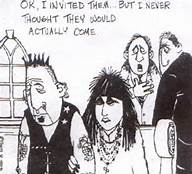Have you ever noticed how people like labels? We use them to identify ourselves and others. I’m Swedish, you’re Italian, he’s Costa Rican and she’s Japanese. I’m an Independent, they are Republican or Democrats. I’m Christian, they’re Muslim and she’s Buddhist. You’re Roman Catholic, I’m Lutheran, I think he’s Presbyterian and she’s non-denominational.
I guess labels help us relate to people—as long as they conform to our preconceived ideas. Labels can sometimes prevent us from getting to know the individual with his or her personal traits and characteristics. We have to make a determined effort to get beyond the labels.
In a previous blog, I revealed that I grew up in a Lutheran congregation that was on the pietistic side of Lutheranism. Generally speaking, the group of people who influenced me in my formative years could be classified (or labeled) conservative—politically, morally, ethically and personally. The congregations in which I grew up were also zealously evangelical. We wanted to tell people; to shout it from the rooftops that Jesus was the way to an abundant and fulfilling life. I proudly wore the moniker “conservative evangelical.” I wore it, that is, until those words were commandeered so as to be politically charged and understood to be judgmental, non-intellectual, and critical of science and technology.
I’m proud of my Lutheran label, but it has its limitations. There are many branches of Lutheranism. While we all claim to emphasize “grace,” we all do this in different ways and different amounts. To be candid, I must confess that I think that some branches of the Lutheran tree are rather graceless.
“Progressive Christian” is beginning to grow on me. I like the idea of being progressive—open minded. I appreciate the critical role that progressive Christianity has played in bringing certain areas of theology and Biblical interpretation into the twenty-first century. I’m not comfortable with the fact that, at times, progressive Christians are known more for what we are against than for what we are for.
The label that I am most comfortable with is “Evangelical Inclusionist.” I’ve never heard anyone else identify themselves with these two words, but I think that they pretty well describe me.
As an inclusionist, I affirm that Jesus through his life, death and resurrection, ushered in the Kingdom of God. I would also insist that Jesus did not do this for a small nation who called themselves the People of God, or those who identify themselves as “little christs” or Christians. Jesus ushered in the Kingdom of God for the whole world—all creation. Everyone is included in the saving acts of Jesus—no matter what religious system they identify with, no matter their worthiness or unworthiness. If the people are a part of this corner of creation we call earth, then they are included.
Inclusionism is different than Universalism. I want to affirm that Jesus is “The Way.” I’m not quite ready or capable of saying that all religious roads lead to the same place. Because of what Jesus did, however, I affirm that we are all included in God’s kingdom. With everyone in rather than the majority out, we can begin to talk with each other, share the truth as we understand it and learn from each other. This sure seems like a better option than arguing with each other and occasionally fighting each other for our beliefs.
I’m evangelical, too. I want to tell everyone about what Jesus has done—the good news—proclaim that life in God is a life that is abundant and free. My motivation is not to save people from hell—people don’t really respond to that message and hell’s existence is somewhat questionable. What gets me excited is that people can live in the reality of the kingdom of God today. We don’t need to wait until the end of our days to experience heaven. We can have heaven—God’s presence and power—on earth.
Admittedly, my labels and ideas are still in the formative stage. So you can help. I’d love to read your thoughts and ideas; get your feedback on my words. Together the Holy Spirit may teach us and guide us so that we might reflect in our lives divine mystery we call God.

